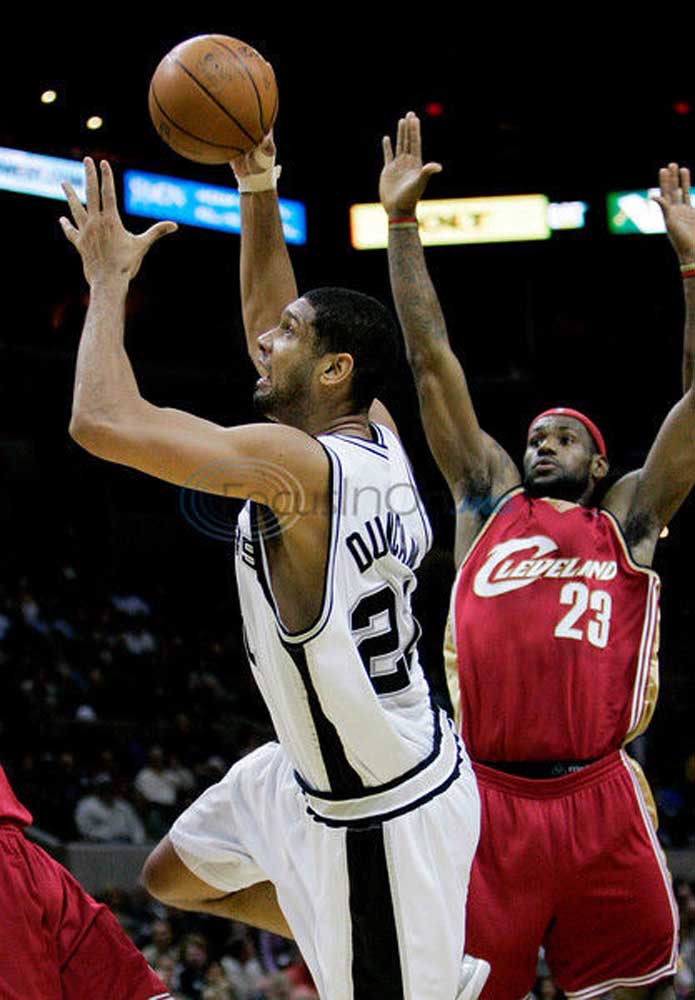James and Duncan in battle to determine player of this century
Published 11:46 pm Wednesday, June 5, 2013

- San Antonio Spurs forward Tim Duncan (21) shoots in front of Cleveland Cavaliers forward LeBron James (23) during the first quarter of their NBA basketball game in San Antonio, Thursday, Jan. 17, 2008. (AP Photo/Eric Gay)
Skip all the formalities and get right to the point. The NBA Finals matchup means more to two individual legacies — that of Tim Duncan and LeBron James — than perhaps the San Antonio Spurs and Miami Heat teams they represent.
The 1960s belonged to Bill Russell and the Boston Celtics. The landscape shifted to Lew Alcindor/Kareem Abdul-Jabbar in the 1970s. Magic Johnson proved the man of the 1980s while leading the Los Angeles Lakers to five NBA titles.
Trending
Michael Jordan stole the spotlight during the 1990s with six championships for the Chicago Bulls. The first decade of the 2000s saw Shaquille O’Neal and Kobe Bryant tie with four titles each – three together with the Lakes and one apiece on opposite teams.
As for the current decade and century? Let the next two weeks decide. Bryant and James both own one title during the ‘10s, with Duncan on the verge of doing something few could dream of: win championships in three different decades.
Just when Duncan appeared on the way out, going six years without at title after winning it all in 2007 over James and his former Cleveland Cavaliers team, the Spurs shot back into the equation.
As for James, he returns to the place most expected the defending champions to be: The Finals.
One quality Duncan and James share is playing at a high individual level as well as team ball. The two both made the All-NBA first team, Duncan for the 10th time and James for the seventh.
The Spurs have won 50 consecutive games in 14 straight seasons with Duncan as the center of attention — that includes a shortened 66-game lockout season in 2011-12.
Trending
James is in The Finals for the fourth time in his 10-year career. He holds a 1-2 record in The Finals, with the previous two denials coming courtesy Texas teams — Duncan’s Spurs in 2007 and Dirk Nowitzki’s Dallas Mavericks in 2011.
One thing the two can’t share: the title and bragging rights as player of the decade, if not century, considering Duncan can tie Bryant with the most titles since 2000 and James would have multiple titles going forward with considerable time left in his prime.
The following questions, better known as The Finals exam, offers insight into the championship series starting today in Miami.
FINALS EXAM
How will rest impact the series?
San Antonio received more than a week off after dusting off Memphis in four straight games. Lengthy breaks have been known to leave teams rusty. With veterans such as Duncan and Manu Ginobili on the roster, coupled by Miami coming off a physical, seven-game series with the Indiana Pacers, the Spurs could benefit from the rest, not to mention getting extra time to formulate a plan against a deep Miami team, albeit one suddenly overly-dependent on James.
What favors each team?
San Antonio sports a well-oiled offense, one predicated on ball movement that helped the Spurs rank first in the regular season in assists per game (25.1) and fourth in both points per game (103.0) and 3-point field goal percentage (37.6). The Spurs own the top scoring defense (95.4) in the playoffs.
Miami makes teams pay with its ability to take and knock down good shots, leading the league in field goal percentage (49.6) and ranking second in 3-point accuracy (39.6), fifth in scoring (102.9) and fifth in opponents’ field goal percentage.
The Heat’s one weakness, as the Pacers showed in the Eastern Conference finals, is on the boards, where Miami ranked last in the league in rebounds per game.
Which team has the best supporting cast?
Not many teams have multiple NBA Finals MVP winners on one team, a distinction Miami and San Antonio can each claim.
While Duncan, a two-time league and three-time Finals MVP, is the face of the franchise, Parker (2007 Finals MVP) is considered the team’s best player and the future of the Spurs. On the flip-side, the Heat have three current all-stars on its roster counting James, a four-time MVP and reigning Finals MVP, along with Dwyane Wade (2006 Finals MVP) and Chris Bosh. The edge goes to the Spurs, who had six players average double figures in the regular season compared to four for the Heat.
What would the title mean for the winner?
San Antonio cements its dynasty tag with another title – which would be the fifth in 14 years, a run of success only matched by the Los Angeles Lakers over the same span.
Duncan could lay claim to being the best power forward ever, and Spurs coach Gregg Popovich would move on to a short list of best coaches in history along with Phil Jackson and Red Auerbach. For the Heat, a title vaults James to elite category of players with multiple titles and most valuable awards. A victory would make the Heat one of eight NBA teams with three or more titles.
Who wins the series and why?
After hitting last year’s NBA Finals on the head in a similar preview – Miami in five games over Oklahoma City – the 2013 series caused me to scratch my head. Both franchises have great leadership, great experience and play solid team ball. Home-court advantage makes it tough to pick against the Heat, who have the game’s best player in James and momentum going back to last year’s title win.
The Spurs, however, rival the Heat in offensive and defensive efficiency, go just as deep on the bench, and hold two key advantages: on the sideline with Popovich and inside the paint patrolled by Duncan.
Final answer: Spurs in seven.



